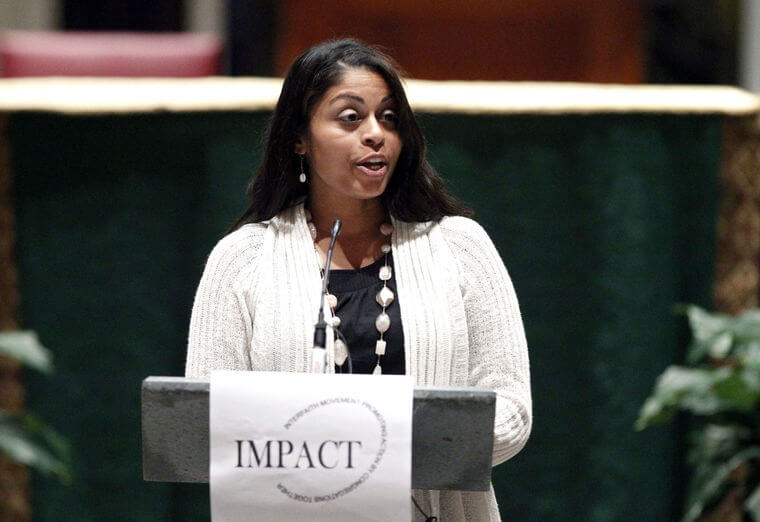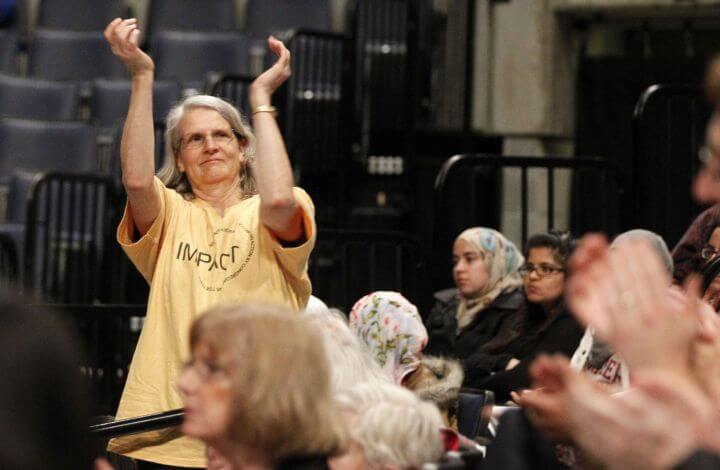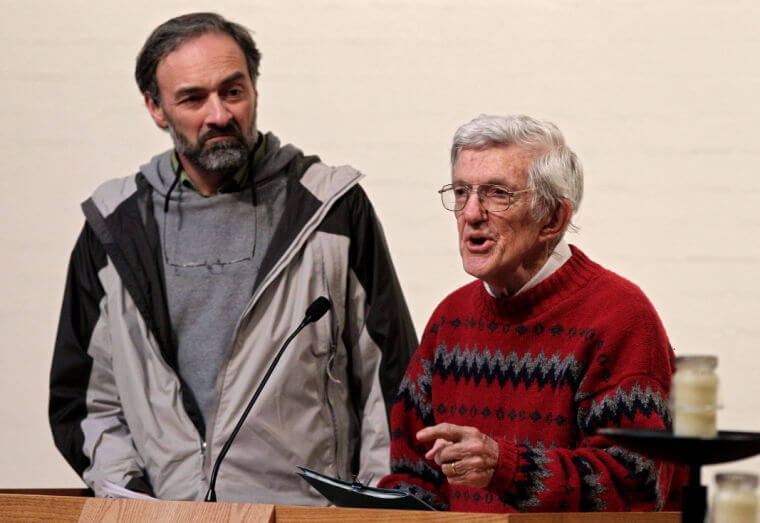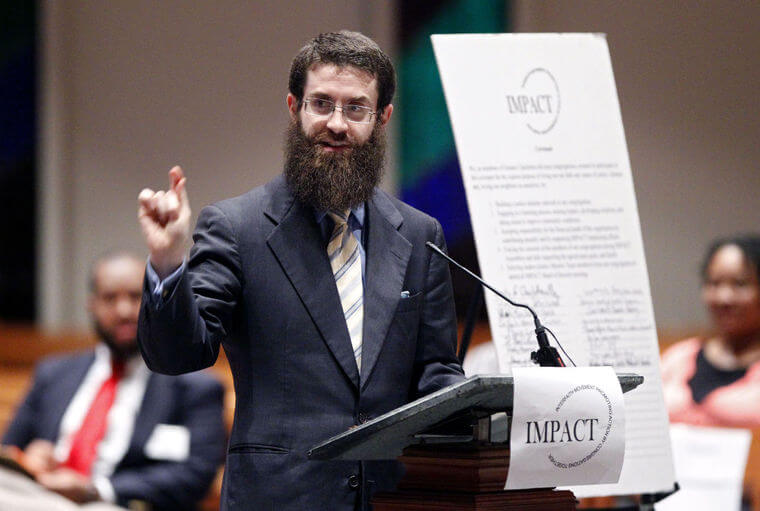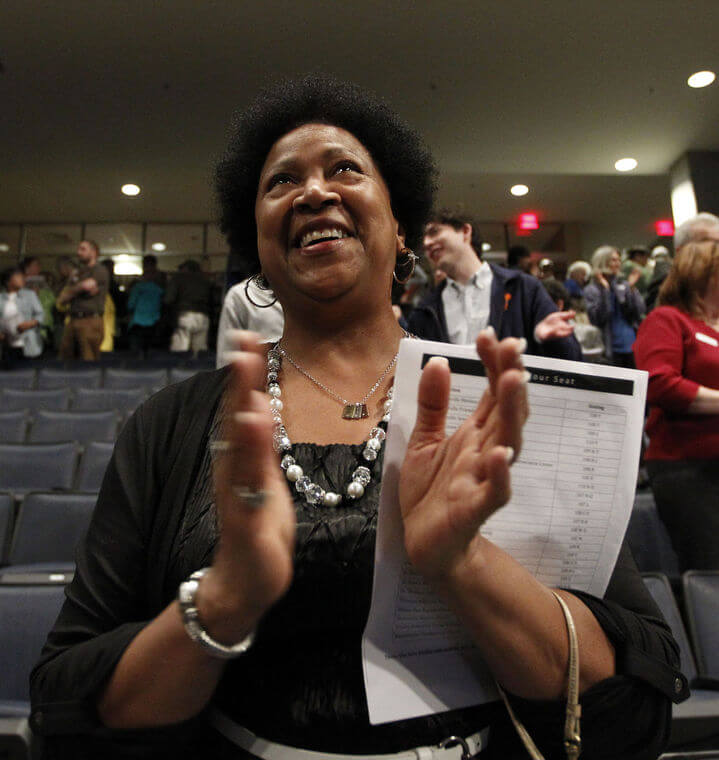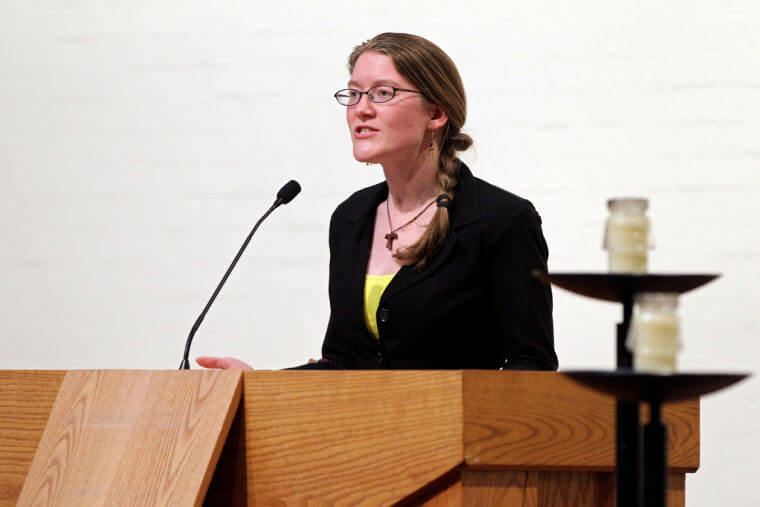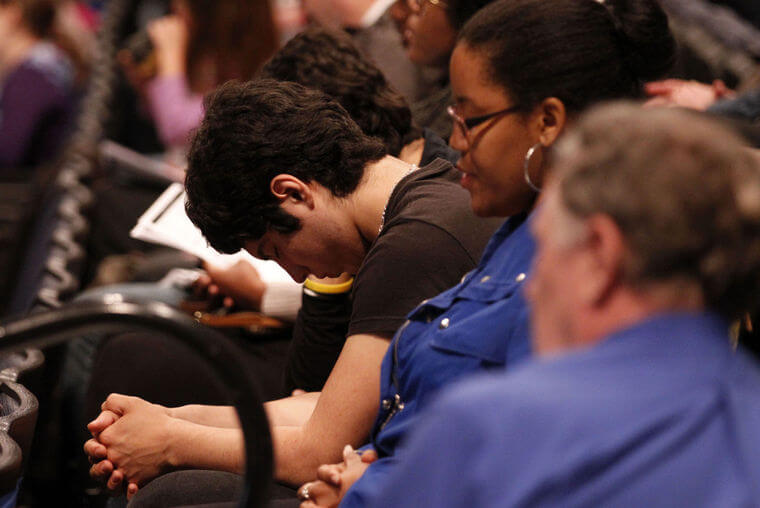IMPACT
Interfaith Movement Promoting Action by Congregations Together
Background
What is IMPACT?
The Interfaith Movement Promoting Action by Congregations Together (IMPACT) organization is a constituent-led, grassroots initiative that brings together Charlottesville’s diverse faith community to address the root causes of serious community problems. IMPACT is not a direct service organization, meaning we do not provide services such as food or shelter to those in need. Rather, we are a direct action organization, committed to empowering local leaders to identify problems and develop solutions to address systemic problems at their source.
Current Membership
Currently, IMPACT has 26 member congregations that join together to work on the root causes of serious community problems. We represent over 15,000 people in the City of Charlottesville, Albemarle County, and the surrounding counties. IMPACT is a diverse organization that unites the community across socioeconomic, racial, geographic, and denominational backgrounds, including Protestant, Roman Catholic, Unitarian Universalist, Quaker, Jewish, and Muslim faith traditions.
About IMPACT
Staff
Lead Organizer: Aidan Workman
Associate Organizer: Eli Krakow
Associate Organizer: Hannah Cullen
What we do
Our Impact
Since 2006, IMPACT has won a number of significant, sustainable improvements in public transportation, creating and sustaining affordable housing efforts, revitalizing low-income neighborhoods, reducing the academic achievement gap, and ensuring access to dental care for low-income and uninsured populations – all achieved through our direct action meetings each spring that bring together over 1,500 community members.
Transportation
Problem: People who relied on public transit could not get to work on Sundays or evenings; that people had to cross dangerous intersections like the I-64 interchange to be able to go grocery shopping; people were having to spend as much as $40 on taxis to get access to social services because no bus line served the county government office.
Solutions: Sunday bus service on the two most heavily traveled routes, night service on route 5, and creation of a new bus route to serve the county office building and low-income neighborhoods.
Results: Not only can more people get to work and go shopping, but ridership has increased by as much as 120% on these routes.
Affordable Housing
Problem: Far too many low- and middle-income individuals in the community are rent-burdened, meaning they pay at least 30% of income for housing, with some paying as much as 50% or more in income; there is also a 4,000 unit shortage of rental housing in the Charlottesville-Albemarle area.
Solutions: Establish the Charlottesville Affordable Housing Fund offer monetary incentives to build, rehabilitate and preserve affordable homes.
Results: Since its creation the Charlottesville Affordable Housing Fund has spent $21 million and has built, preserved and rehabilitated 1200 units of affordable housing.
Interpretive Services
Problem: There is a lack of availability of consistent quality language access services for individuals with limited-English proficiency (LEP). Many LEP individuals–including immigrants and refugees–have difficulties when interacting with law enforcement officials.
Solution: The Regional Jail and both City and County Police Departments agreed to develop and implement LEP plans for their departments.
Results: The City of Charlottesville Police Department has completed their LEP plan by training 100% of their officers in the proper protocol when addressing non-English speaking peoples. The Regional Jail now offers ESL to inmates and has identified documents to be translated to Spanish.
Young Adult Unemployment
Problem: Young adults in our community were three times more likely to be unemployed than anyone else. Healthcare is the #1 growth industry in our region. There is a shortage of people trained in the healthcare field, because these jobs require post-high school training. 2/3 of young adults in our area do not have any post-high school education. Due to he high cost of tuition, these good healthcare jobs that give entry to the career ladder were simply out of reach.
Solution: A collaborative job training program between our largest employer, UVa Health Systems and educational institutions that will to provide tuition waivers and other support for young adults seeking a family-supporting career in healthcare.
Results: UVa Medical Center investing approximately $218,000 to engage and hire un-and underemployed 18-25 year-olds. Students will get Full tuition for 8-week Certified Nursing Assistant Training (Institution has 95% success rate), nighttime classes, day-to-day stipend, work place readiness and other soft skills training, and peer mentorship provided through the beginning to 12 months into employment at UVA. When they complete their training, if successful, students can begin work at UVA Medical Center with an average salary of $12.99/hr, expecting a 6% raise in 12 months. Over 200 graduates have completed the program and have gained family-supporting work.
Youth Mental Health
Problem: 376 students in our public schools seriously considered suicide in 2012. While not all of these kids need psychiatric help, those who do were waiting an average of 3 months to see a psychiatrist at our largest mental health care provider (Region Ten); during this wait their crises continued. We learned that Region Ten offered only 15 hours of psychiatric care each week for their entire service area that spans Green, Louisa, Fluvanna Nelson and Albemarle Counties.
Solution: Region Ten increase the hours they offer to 40 hours of child psychiatry each week.
Results: A full-time child psychiatrist began working for Region Ten on May 1st, 2015. They anticipate being able to see over 300 additional kids each year.
Immigrant Rights
Problem: The Albemarle Charlottesville Regional Jail (ACRJ) has voluntarily assisted in Immigration and Customs Enforcement’s (ICE) detention of over 100 undocumented immigrants in the past four years, the majority of whom are non-violent offenders. Many of these non-violent offenses are connected to driving without a license, which is not provided to undocumented residents. This has resulted in a culture of fear within the over 10,000 immigrants in our community, keeping community members from reporting crimes and making all residents less safe.
Solution: In April 2020 Virginia’s Governor signed a bill that gave jails the ability to choose if they inquire about citizenship for inmates with misdemeanor offense. Given this bill was going into effect on July 1 we wanted them change their practice of inquiring about citizenship for non-felony offenders.
Results: 60 IMPACT leaders attended their June 2020 virtual board meeting and got the jail superintendent to change their practice which can save 40 people per year from deportation.
Dental Care
Problem: There was a wait list over 1,000 names long for the uninsured to receive dental care; and that many uninsured dental cases were being seen in emergency rooms because they could not access primary dental care.
Solution: Get University of Virginia and Martha Jefferson Hospitals to expand the the staff at the Free Dental Clinic.
Results: In 2018 alone 2,178 ER visit related to dental care were prevented, saving $2.8 million. Since 2008, the clinic has served over 6,000 patients and the wait list to receive dental care has been reduced by over two-thirds.
Early Childhood Education
Problem: In the county, one-third of low income students and one-quarter of their counterparts in the city are ready for kindergarten.
Solutions: Increased enrollment and classroom expansion for low-income preschoolers.
Results: In March of 2010, we pressed City and County Superintendents and School Boards to prioritize low-income children for pre-K enrollment and expand the number of locally funded pre-K classrooms.
As a result, between 90% and 100% of enrolled children in three- and four-year-old classrooms are designated low-income and significant achievement gap decreases have been measured, with as many as100% of students passing 3rd grade PALS standardized tests. The City and County will continue to collaboratively expand to have 20+ pre-K classrooms and to increase enrollment to all children.
Due to these efforts, kindergarten preparedness in Charlottesville City Schools has grown to 84%.
Mental Health for Ex-offenders
Problem: Ex-offenders with mental illness did not receive medication or therapy upon release from the jail or prison. No agency was equipped to provide treatment to this population, so many ex-offenders’ conditions would result in homelessness, a stay in the emergency room, or admission back into prison.
Solution: Sustained City and County funding for Healthy Transitions, a psychiatric re-entry program between the local mental health community services board and the Probation and Parole office.
Results: Healthy Transitions is now hailed as a statewide best practice, and has reduced recidivism among participants to 10% as compared to the state 25% average. Before this program, ex-offenders were waiting up to 11 months to get care; now, the wait time is only two weeks.
Homelessness
Problem: In 2013 there were approximately 500 homeless or unstably housed children enrolled in our city and county schools. In addition, we learned that there are roughly 200 homeless adults on any given night in our community. Our community lacked a community-wide strategy to move people into stable housing and ensuring that their people are getting the help that they need. Although one was created to end homelessness by 2012, little to no collective moves were being done to make that a reality.
Solution: The establishment of a Roundtable to Reduce Homelessness.” This roundtable has acted as a coalition of organizations and institutions that are already trying to help mitigate our community’s growing homelessness problem. Increased cooperation will make our existing institutions more effective and efficient at moving people off of the streets and into stable housing.
Results: Over $950,000 has been leveraged that would have been inaccessible for our community without collaboration. In 2014, 47 families were rehoused and 60 families were prevented from becoming homeless.
Addiction
Problem: 3,150 people who go through our local jail each year struggle with substance abuse. People could be diverted from jail to residential treatment, but there was no local option available for women. If there were beds available, women had to travel 70 miles for treatment and could not bring their children with them.
Solution: Creation of a residential drug treatment center for women, developed by Region 10 Community Services Board and half its programmatic costs covered by Charlottesville and Albemarle County
Results: The Women’s Center at Moore’s Creek opened in October 2018 to serve women and up to two of their preschool aged children. Over 100 families have been treated since its opening.
News
IMPACT in the News
community organizing careers
Interested in a career with IMPACT?
Sign up to be notified the next time we’re hiring organizers
